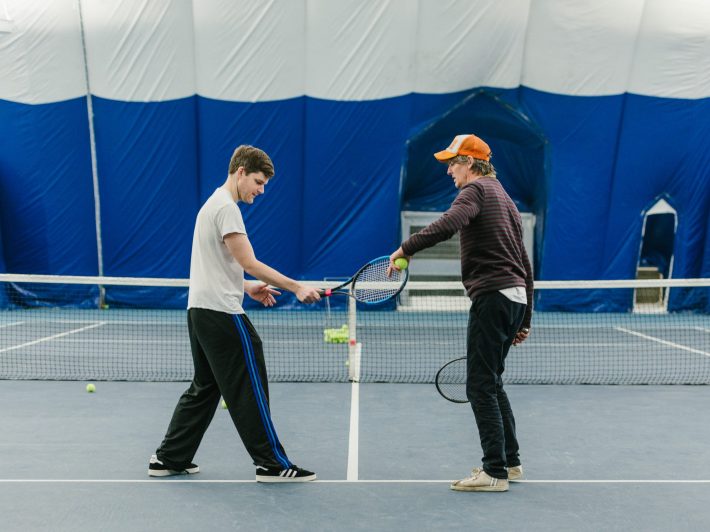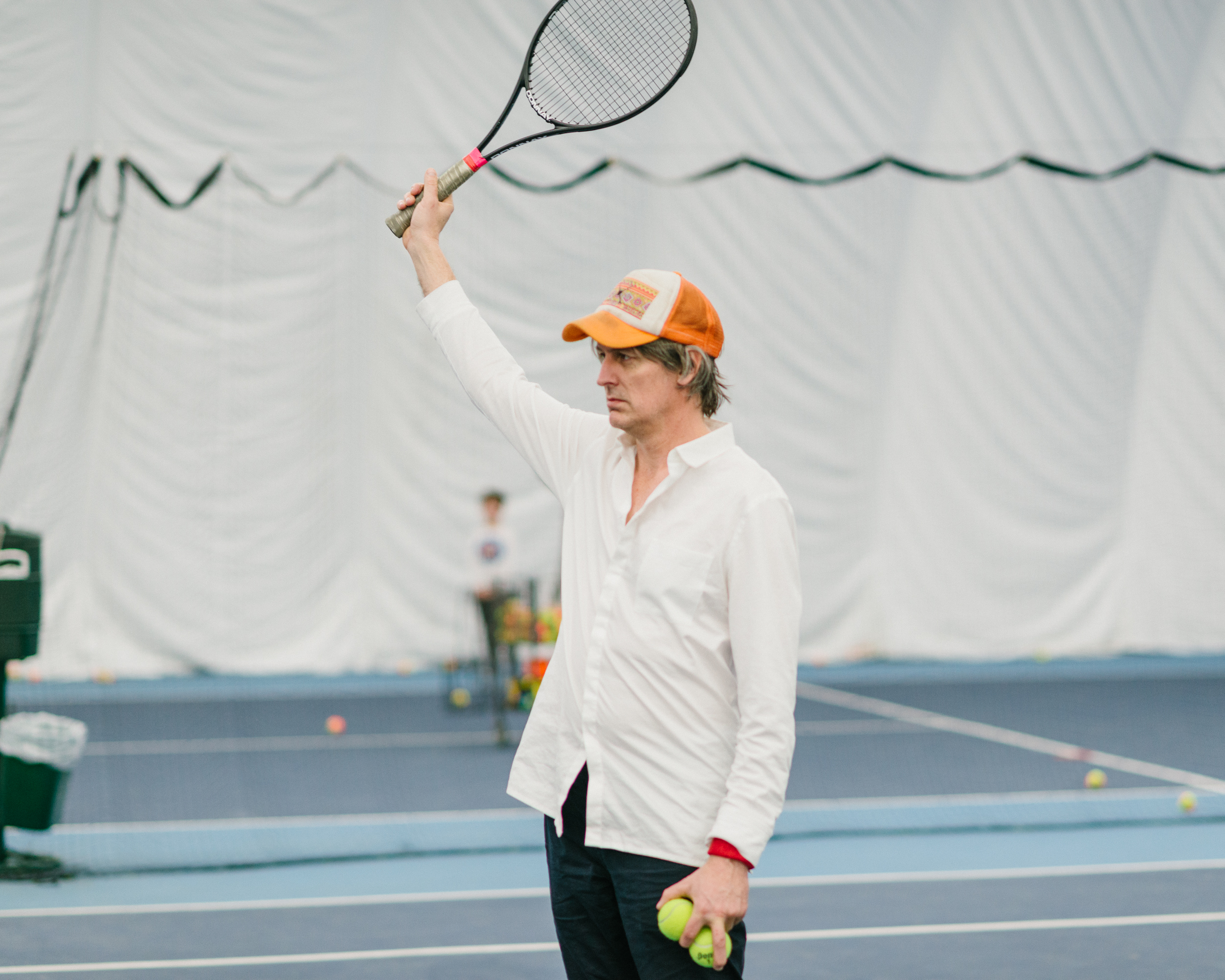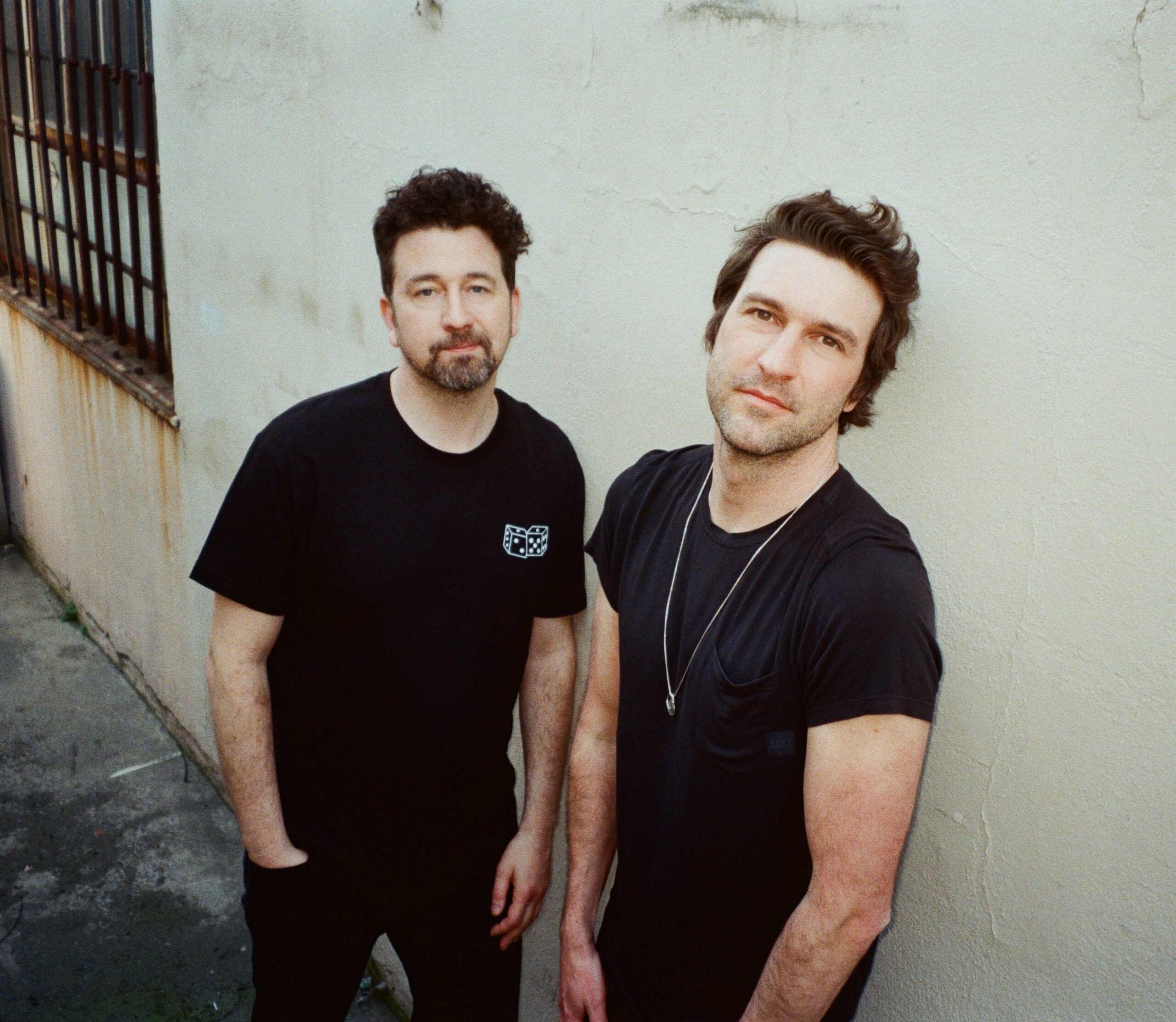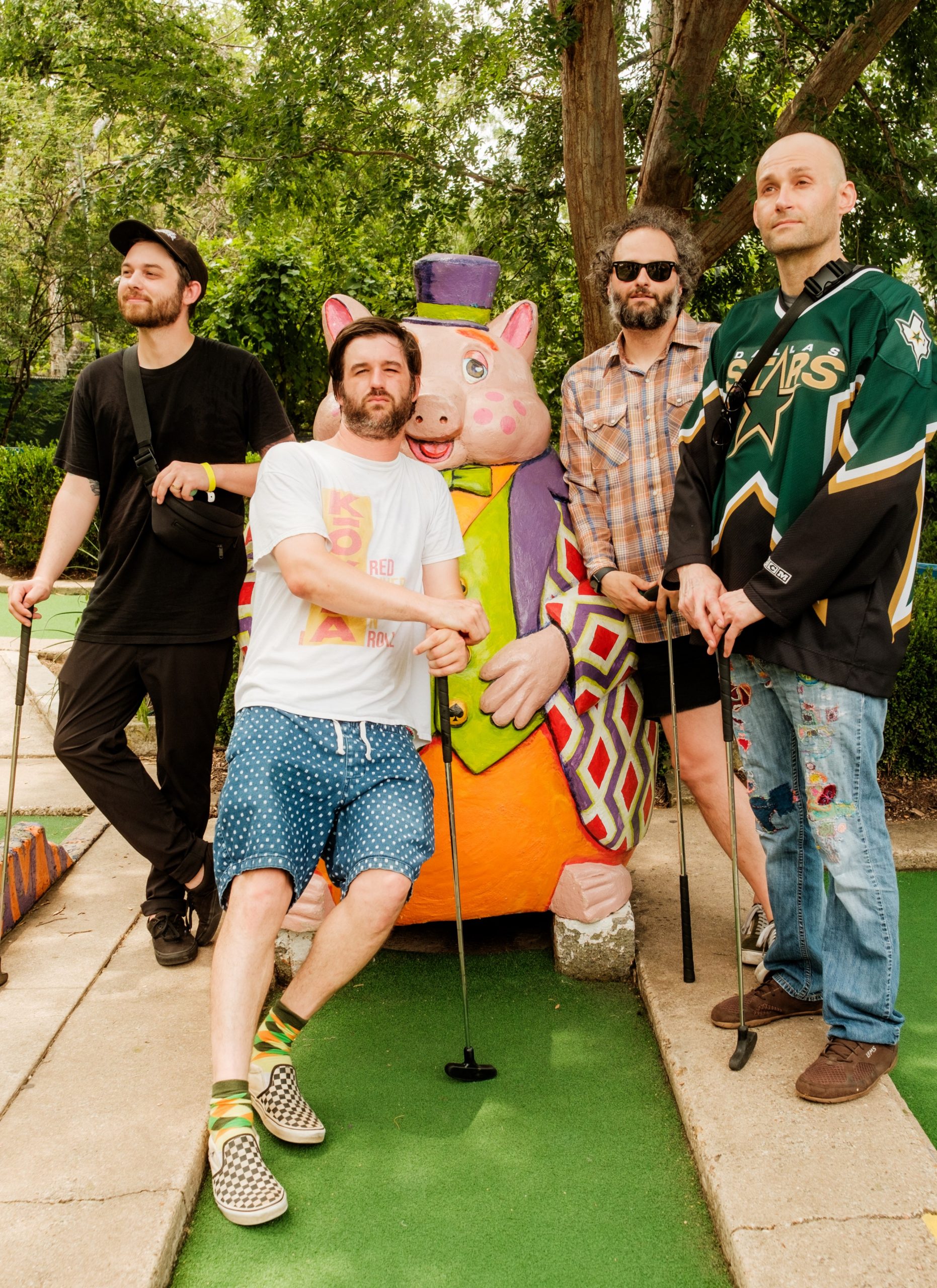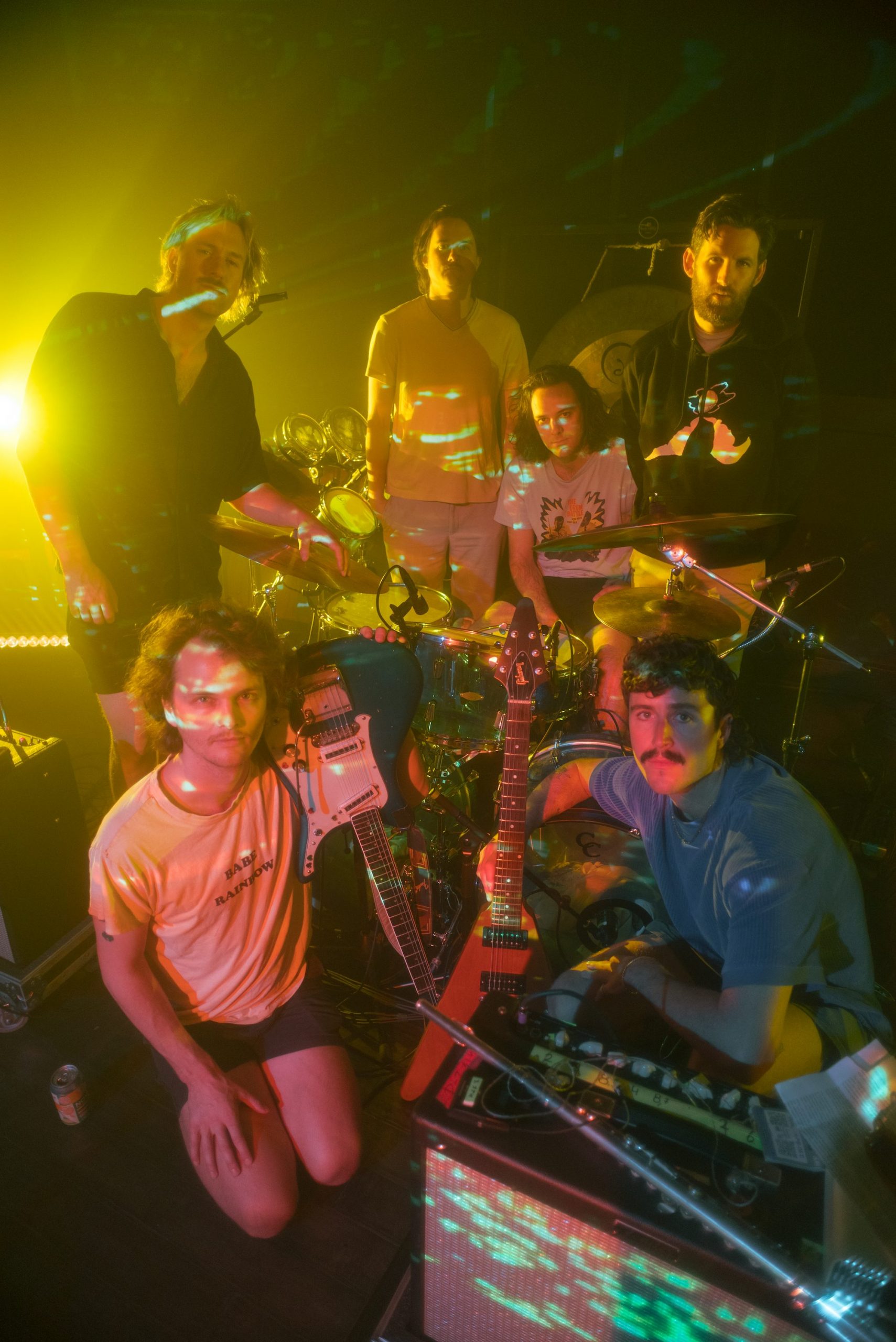The indie rock legend teaches Stereogum how to hit a tennis ball
For a very brief moment, Stephen Malkmus is spooning me.
He leans over me, puts his right hand over my right hand, and guides me through a proper tennis swing. I'd been losing too much power during our match and not hitting the ball correctly. So he's taken matters into his own hands to demonstrate what an unhurried and fluid form feels like. He does this a few times, until it seems like I maybe sort of have the hang of it. I don't. But it's nice of him to try.
"OK, try not stepping," he said a few minutes earlier, as I stumbled forth, and nearly over myself, to connect my racket with a gingerly paced green ball, only to see it breeze past by me. I'll connect with the next ball he serves, as the law of averages is my friend this morning. I do my best to send it back. It plops about a foot in front of him. "Move your body," he advises, calmly. "Use your hips."
This is not the advice I expected to receive from a man who is commonly referred to as an indie rock legend. But I do as I am told, because who am I to argue with he who wrote "Summer Babe (Winter Version)"?
As I told my CrossFit instructor recently as he tried to hide his dismay at my hideous push-up posture while getting my reps in (there is no amount of money that could get me to keep my spine straight or elbows properly angled; you may as well ask a fish to fly), what I lack in any sort of athletic ability, I try to make up for with gusto. So I lock my legs in, swing my hips as instructed, and launch the ball well over Malkmus' head to the court next to us. The 40-something grey athleisure-clad woman looks over and grimaces. I utter one of the days' many apologies and retrieve the ball. I send it Malkmus' way, and he hits it back. A small victory for us both.

On an early afternoon in mid-March, I packed track pants and donned several layers of warm clothing to arrive at McCarren Park Tennis Courts, an indoor athletic facility with several courts and the antiseptic feeling you get from the nicer health clubs. Arriving here meant trudging through something called a bomb cyclone. This is, basically, a blizzard that is also, inconveniently, sort of a hurricane. Which is to say, a total motherfucker to walk through; the constant snow flurries lodged in my eyes made it difficult to figure out where the entrance was and prevented me from getting into any sort of pre-game champion headspace.
All this for a game of tennis. For me, tennis is similar to all other organized sports in that I don't watch it or play it. It is, respectfully, Not My Thing. I begrudgingly do yoga and HIIT-type activities to atone for my pizza-based lifestyle, but that's about the extent of my athletic prowess and interest. But if this is what I must do to talk with Stephen Malkmus, then this is what I will do.
After we finish our game, we sit down in the white-walled reception area. In a bit, we will discuss his new album, the quite lovely and socially engaged Sparkle Hard, which is out this Friday. But first I want to thank him again for his time and endless patience.
"This is my first time playing," I say. "I'm sure it's frustrating watching me."
He doesn't shrug. He doesn't need to. There is absolutely no need for him to signal that something bothered him enough to necessitate a shrugging off. It's doubtful much could. Unbothered is pretty much his thing.
Starting with his work co-fronting Pavement, Malkmus evolved the template of cool in a way that is rare for contemporary pop musicians. Not "cool" in the common parlance, in which the term is mainly used interchangeably with "neat" or "interesting," mind. But cool as in the Beatnik-derived aesthetic commonly associated with Miles Davis and Lou Reed, artists who could keep it so close to the vest it almost seemed like they didn't care, but had enough charisma to draw you into the ocean of feeling beneath the surface. Malkmus perfected an affable, eternally boyish version of this disaffection, and untold musicians would ruin themselves failing to replicate it.
Well before a few stray MP3s could make a career, Pavement's 1992 debut Slanted And Enchanted was one of the first modern viral success stories; dubbed copies of the in-progress album were passed around between critics and music industry insiders for a year before the album was released. It was legendary well before it hit stores, and somehow exceeded the hype. Pavement would go on to have one of the best runs any artist had in the '90s, and Malkmus proved himself to be a musician capable of melodies so sturdy they could afford to appear slack, and a lyricist that could write his way around topics ranging from ennui to capitalism to underground culture itself in a way that avoided obvious interpretations but offered insight to an audience primed to distrust insight. After Pavement dissolved, Malkmus would embark on a solo career, officially branded as Stephen Malkmus & The Jicks, that found him embracing his inner guitar hero and maintaining rigorous quality control.
But before any of that happened, he was a kid from California who liked to play tennis and soccer. He was born in Santa Monica and moved to the small town of Stockton, California when he was young. These days he's a casual player -- usually playing doubles with friends or with his wife, the artist Jessica Jackson Hutchins, and their two daughters.
"It's probably smart to bring a tennis racket on tour. It's not such a big thing to carry," he muses. "At least in lots of parts of America, there are hard courts you can just hop on for free at the right time of year." He was briefly very serious about tennis when he was an adolescent, but his ardor began to cool as he reached the limits of his abilities.
"There's something very competitive about tennis where at a certain point, it's one on one and it can be hard to lose as a little kid. There's tennis brats and stuff. Bad talk," he says. "In the end, maybe I was too competitive to want to do it when I started losing. I don't know what it was, but that's why I stopped. I wasn't satisfied with getting killed."
I am very qualified to assess the skills of Stephen Malkmus, Musician, as I have been a fan for a very long time. I am not qualified whatsoever to assess the skills of Stephen Malkmus, Athlete, but a lack of qualification has never previously stopped me from offering up an opinion. "As near as I can tell, you are good at tennis," I ask. "But do you think you're good? I can't really tell."
"I don't know, I'm not ranked. I don't have a number. You kinda gotta get a handicap or something, I don't have one," he says. "I'm like a high school team, number three, single-seat type of person. Not very good, but good."
Having absolutely no idea what any of that meant, I proffer, "Good for high school?"
"Maybe I'm good for my age, too."
I tell him that I didn't play sports in high school, "as you probably guessed," and instead obsessed over bands like his as a way of forming an identity. He understood what I meant.
"I'm also not a jock, I wouldn't say. I definitely don't identify as one," he says. "I identify more with 'bookish,' clichés of that. But it's OK to be an all-arounder and play a sport."
This is, obviously, true. But teenagers often get into underground culture because they can't see a place for themselves in mainstream culture and thus reject it wholly. Such is youth. But upon maturity, one must remove various chips from one's shoulder.
Still, I tell Malkmus there was a time in my life (roughly the period between birth to before I started watching Friday Night Lights and stopped holding sports culture in complete disdain, dialing it back to polite disinterest) that I thought it was bizarre that he was super into athletics and that Pavement had a fantasy football league, or that the Crooked Rain, Crooked Rain highlight "Stop Breathing" was, he claimed at the time, partly about "imaging tennis as an emotional battleground."
"You can be a fan of these amazing dudes who play these games. Basketball, I love the sport, I like watching the games, I like the origin stories of the players. There's a working-class hero sort of vibe, and a lot of cool stories," he says. "So there's a lot I can get behind. You can also get your statistical-data-math geek on when talking about it."
[photoembed id="1996226" size="full_width" alignment="center" text=""]
Scared of smacking the King of Indie Rock in the face with the ball or bopping the child wearing a Who T-shirt one court over, I barely put any force into the initial swings. But ten minutes in, I loosen up and begin wildly overshooting, lobbing balls several feet above his head and interrupting the neighboring court several times in a row.
"I did take a couple of years off this time, though," he says, noting that it's been four years since the release of his previous album Wig Out At Jagbags. "This has been longer than usual, I'll give myself a little credit." He laughs a bit and adds: "So this is my version of a break, which is why it should sell so much more, and people should like it."
When I ask him why it's important to him, nearly three decades into his career, to stay prolific, he takes a second. "I don't know where that urge comes from: ego, fear, also the not achieving, that's ego related, there's that," he says. "What else? Group interaction is fun. Sharing with my friends, and fans, too, but amongst the group, amongst my cohorts. We all wanna stay busy."
Previous solo Malkmus albums have had easily identifiable marketing hooks, from "the heavy album that Janet Weiss plays on" (2008's Real Emotional Trash) to "the Beck-produced reflection on mortality" (2011's Mirror Traffic). Produced by Decemberists guitarist and fellow Portland mainstay Chris Funk, the new album sees him embracing string-laden, orchestral balladry more than ever before on songs like "Solid Silk" and "Brethren" and engaging in some feisty hard-riffing on "Rattler" and "Shiggy."

Perhaps the most notable wrinkle this time around is that Malkmus is engaging in more pointed social commentary than before. He's always been an elliptical lyricist, but on "Middle America" he engages, in his own way, with the ennui of the flyover states, though he notes, "I have no judgments on middle America. That was a working title, I just kinda kept it." The hypnotic krautrock punk of "Bike Lane" might be the most political song he's ever written. It contrasts an obvious refrain of "another beautiful bike lane" against vignettes of willfully ignored police brutality, specifically lamenting the killing of "sweet young Freddie Gray."
"The song led it there," he says of the political edge. "I had those chords and it reminded me of punks and those 'against the cops, they hate us, we hate them' type of songs. But this kind of cop story is not like that. I think it's the kinda gloves-off type of cop story where there's police brutality and systemic problems that need to be addressed because of multiple reasons. Yeah, the 'us against the cops' thing is not working, that kind of story is just broken, so I just was like, 'This is really what's going on.'
"Meanwhile, there's another part with the beautiful bike lanes and stuff, that's more of just a fact that we all have our local issues that are so trivial that we also spend emotional time and headspace in them," he says. "Could be your local bike lane, could be any lifestyle outrages you have, things you're a little bit embarrassed that you care about."
[videoembed size="full_width" alignment="center" orientation="horizontal"]https://youtube.com/watch?v=i9KQP3Cbt_g[/videoembed]
"It's OK," he replies. "Trying swinging it like you're playing golf," he tells me. I'm not sure what this means, but I do my best to oblige. I connect with the next ball and send it back over to the neighboring court. I apologize again.
"Maybe hit it against the wall for a while," he suggests.
"I'm interested in that kind of music, electronic music, and stoner house music," he says. "But it's also like, does the world need it? Is it good, really? Do I wanna release it?"
He says he has all the basic tracks, but is still putting it together and fiddling around with it. As someone who was in their 20s during the '90s, Malkmus attended his share of raves back in the day and lived in the dance-music soaked Berlin for a year, though Pavement got through their run without ever dabbling in electronic loops and samplers in an attempt to seem up to date. (Though he says their single "Stereo" features Beastie Boys-influenced freestyling.) So this is uncharted territory for him.
"I guess I'm building my skills. I'm behind the learning curve. You can get away with some sense of discovery with being a beginner on Ableton and drum programming. There can be a kind of freshness to that," he says. "I'm still kinda deciding, 'Is it legit, or is it a mid-life crisis rock thing?'"
Pavement reunited for an acclaimed tour in 2010, a few years before '90s nostalgia truly set in. Since then, a number of Clinton-era indie stalwarts have returned, and some of them, such as the Breeders and Dinosaur Jr., have recorded albums that stack up well next to their classic outings. He was particularly impressed by last year's self-titled return from the pioneering shoegaze outfit Slowdive. "I liked the sound of it. It has this really warm pillow production," he says. "I don't know what they sing about. They probably don't know what I'm singing about either, but at least I make it clear and you can hear my words."
Though I realize it is unlikely that Pavement would ever make another album, as Malkmus has always seemed intent on moving forward, there have been times when I've wondered if they could come back and make something strong. After all, everyone else is. I ask him if, in light of seeing so many of his '90s peers coming back, he ever wonders the same thing.

"Of course. I don't know how it would be received, but we could kick out of a Pavement record," he says. "I mean, I'm doing these records, this is my thing with the Jicks. They wouldn't be the same tunes, you know what I mean? I don't imagine I would write different tunes just for Pavement. I'm not sure what would be different."
He thinks it over a bit more. "My tunes through another filter of Pavement drummers and Mark would be different," he says, in reference to his former bassist Mark Ibold and the bands' two drummers, Bob Nastanovich and Steve West. "It would sound a little more like Pavement, maybe a little more laid back or whatever, but a lot of the things come down to the drummer and the bass player and the producer, a lot of things would make it sound different, but if you just add that name on it, I'm not sure what would be different."
He says that he's recently done a number of interviews with writers who were too young to fully experience the '90s, or at least the '90s he lived through, and they look back on it with wonder. He finds this a bit amusing ("They'll have The Terminator or something where it's like this great movie, which I thought was a kitschy fun movie, but I wouldn't buy it") but ultimately flattering, especially when it comes to bands that claim him as an influence.
"Well, that's awesome. What I did, someone else was inspired by," he says. "It means you're still relevant."
[videoembed size="full_width" alignment="center" orientation="horizontal"]https://youtube.com/watch?v=MCNJytiXyLE[/videoembed]
I start running to connect with the balls, and intercept most of them. I'm working up a sweat, and discover to my surprise that I kind of like this game. We start hitting the ball back and forth for several uninterrupted stretches, and for a while, it feels like I'm actually playing tennis, and actually having a good time. Then I flub it on the eighth volley.
"I don't think it would have helped, 'cause you just need to get in there and figure it out," he says. "And then watch other people and listen a little bit, but you do have to figure it out.
"You can watch videos on YouTube, there are free ones if you decide you wanna think about it a little more and the pay against the backstop," he says. "And that's a really good thing to start with, even though it can seem boring. It's a little bit like a dog chasing a ball, but it's a really good way to start and you can also not bother anybody with your mediocrity at that early stage, which we all have, you know?"
Before we say our goodbyes, I tell him I had more fun than I was expecting and thank him again, noting that he probably had to tap into his dad patience to get through watching me fumble around. He doesn't quite confirm this, but notes "My kids don't like to be told what to do sometimes.
"I tried to give some tips," he says. "At least you listened, you know?"
